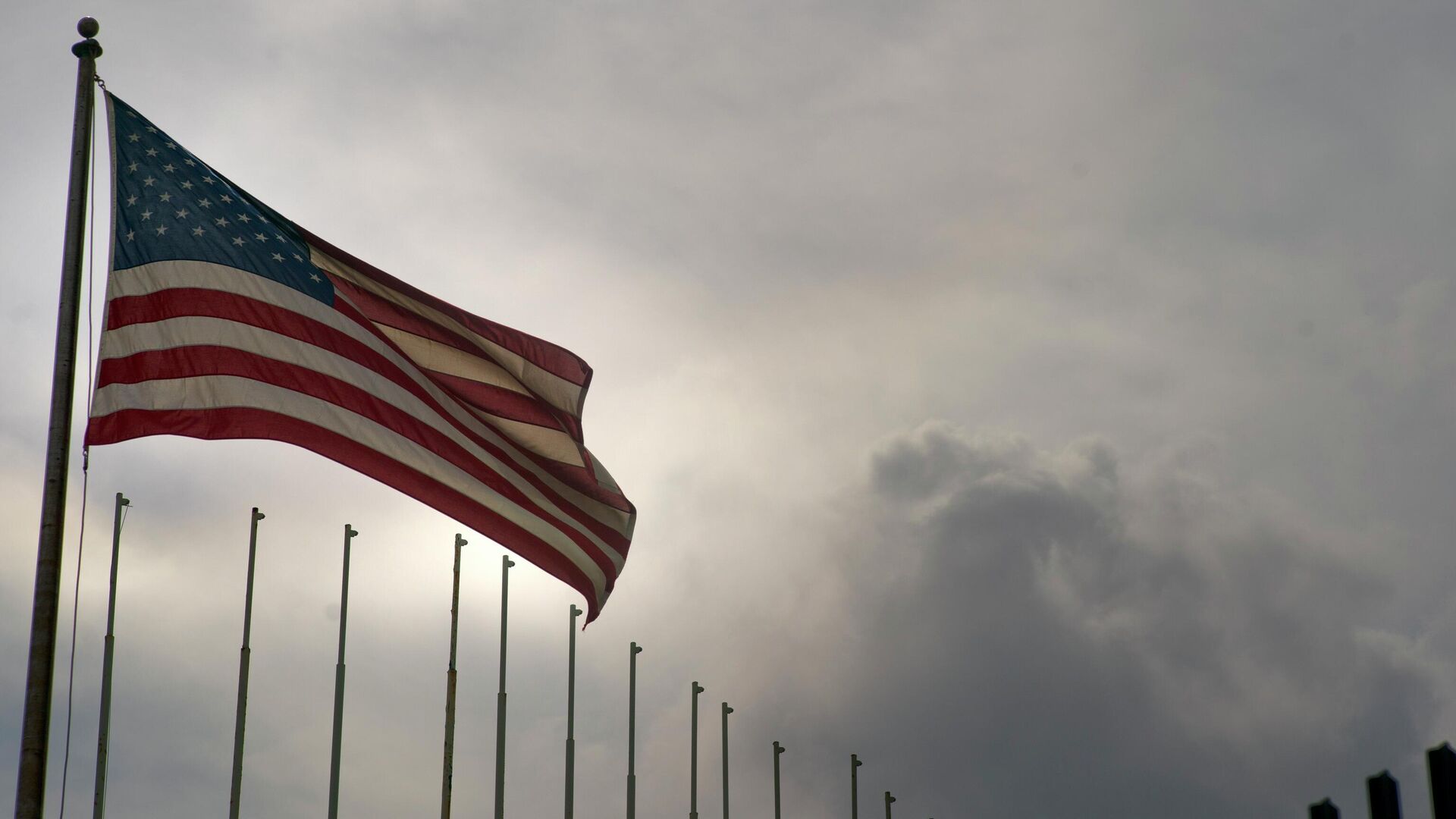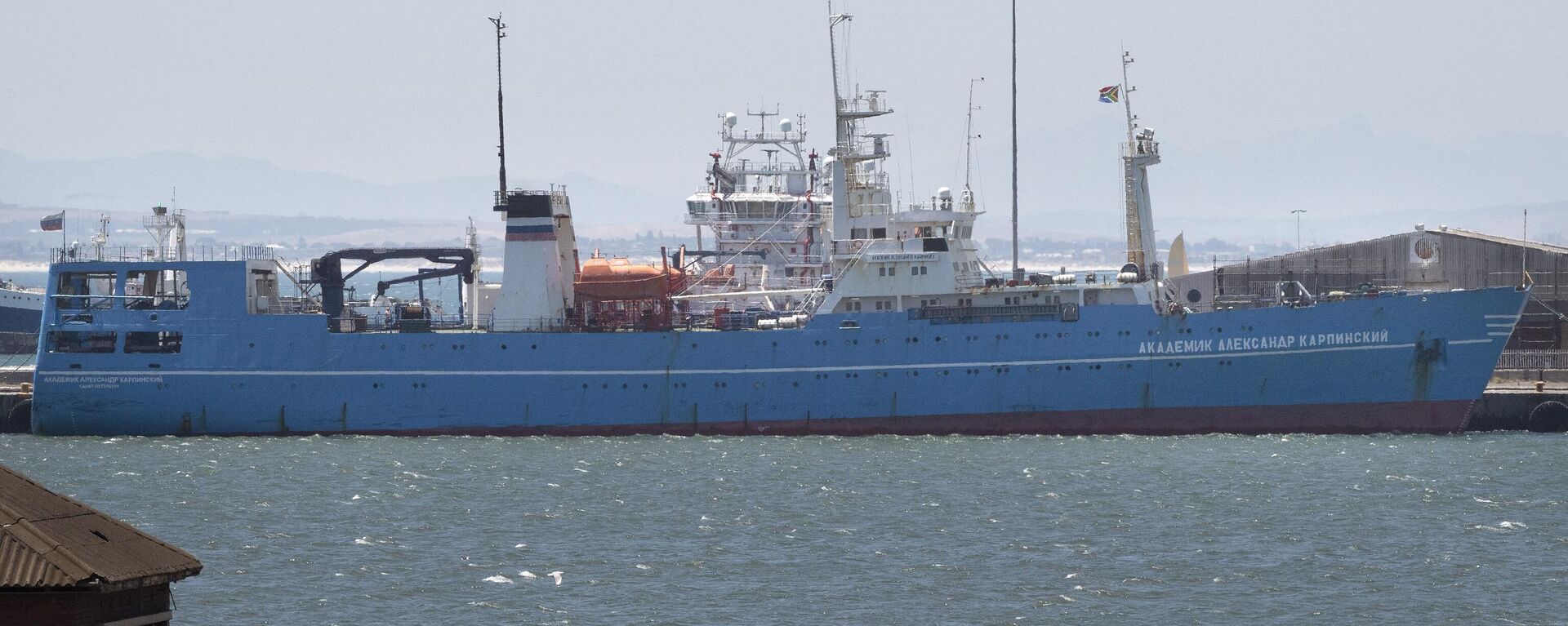https://en.sputniknews.africa/20230904/us-bullying-pretoria-wont-last-long-south-african-expert-on-lady-r-scandal-1061869382.html
US 'Bullying' Pretoria Won't Last Long: South African Expert on Lady R Scandal
US 'Bullying' Pretoria Won't Last Long: South African Expert on Lady R Scandal
Sputnik Africa
In May, the US Ambassador to South Africa claimed that a Russian vessel Lady R loaded arms in South Africa late last year, which sparked a diplomatic row... 04.09.2023, Sputnik Africa
2023-09-04T19:45+0200
2023-09-04T19:45+0200
2023-09-05T09:28+0200
opinion
cyril ramaphosa
vladimir putin
united states (us)
south africa
russia
north atlantic treaty organization (nato)
multipolarity
ukraine crisis
lady r
https://cdn1.img.sputniknews.africa/img/07e7/07/07/1060387480_0:160:3073:1888_1920x0_80_0_0_a8d2fdb087bf1afb31d82f2213f128cf.jpg
The United States could opt for being "a partner in a multipolar world" or could continue fighting for the hegemonic position, which is not going to last for long, Senior Research Fellow at the Centre for African Diplomacy and Leadership at the University of the South African city of Johannesburg Oscar van Heerden told Spuntik Africa.Continuing the thought about the change of the US hegemonic position, the scientist noted that there is a shift towards China as the leading power.Commenting on the diplomatic conflict between the Pretoria and Washington, caused by the US allegations against South Africa for arm sales to Russia, the expert highlighted that "diplomacy needs to be more carefully considered," adding that the behavior shown by the US is inadmissible.In May, the US ambassador to South Africa Reuben Brigety claimed that the Russian ship Lady R had collected armaments from the Simon’s Town Naval Base in South Africa in December. In response to that, South African authorities launched an investigation of the situation by a special commission.In early August, the panel presented the results of the investigation to the country's President Cyril Ramaphosa. According to the commission's report, no evidence in support of the accusations have been found.Elaborating on the motives of the US actions, van Heerden assumed that the country wanted to crash the South African currency and tarnish the state's image.Moreover, the expert said that in the context of the ongoing Russian special military operation in Ukraine, supported by the West, the actual aim of the US is to encourage the countries to "condemn Russia."Speaking about the nonalignment movement (NAM), van Heerden underlined that, although, it "does not function anymore", South Africa along with some other states still adheres to this principle so as not to be caught between "great powers."He added that the African country is determined not to "be fooled or cajoled into taking a position" in order not to be "be forced and blackmailed" to pick sides in the future. Furthermore, the scientist emphasized that such US moves are not something new, citing the wars in Iraq, Afghanistan, Syria, Libya as examples.Regarding the possible further attempts of the US to force states to adopt a certain position, van Heerden believes that the country is not likely to resort to the same strategy as in the Lady R incident, as it "hasn't worked."However, the expert is convinced that, given the weakening US hegemony, the State Department will continue its activity but will use other methods. What's more, the scientist noted that the US with its actions creates a threat of nuclear war.Van Heerden also stressed that this is "a moment of introspection" for the US, when the country needs to show that "they can lead and not necessarily be the bully".
https://en.sputniknews.africa/20230904/what-has-lady-r-investigation-commission-established-1061866587.html
united states (us)
south africa
russia
Sputnik Africa
feedback@sputniknews.com
+74956456601
MIA „Rossiya Segodnya“
2023
Rasina Musallimova
https://cdn1.img.sputniknews.africa/img/07e7/0a/17/1063019139_0:0:646:646_100x100_80_0_0_348c74b69cf86748a53875f8148a2f85.jpg
Rasina Musallimova
https://cdn1.img.sputniknews.africa/img/07e7/0a/17/1063019139_0:0:646:646_100x100_80_0_0_348c74b69cf86748a53875f8148a2f85.jpg
News
en_EN
Sputnik Africa
feedback@sputniknews.com
+74956456601
MIA „Rossiya Segodnya“
Sputnik Africa
feedback@sputniknews.com
+74956456601
MIA „Rossiya Segodnya“
Rasina Musallimova
https://cdn1.img.sputniknews.africa/img/07e7/0a/17/1063019139_0:0:646:646_100x100_80_0_0_348c74b69cf86748a53875f8148a2f85.jpg
cyril ramaphosa, vladimir putin, united states (us), south africa, russia, north atlantic treaty organization (nato), multipolarity, ukraine crisis, lady r, accusations, arms supplies, diplomacy, nuclear weapons, africa insight
cyril ramaphosa, vladimir putin, united states (us), south africa, russia, north atlantic treaty organization (nato), multipolarity, ukraine crisis, lady r, accusations, arms supplies, diplomacy, nuclear weapons, africa insight
US 'Bullying' Pretoria Won't Last Long: South African Expert on Lady R Scandal
19:45 04.09.2023 (Updated: 09:28 05.09.2023) Longread
In May, the US Ambassador to South Africa claimed that a Russian vessel Lady R loaded arms in South Africa late last year, which sparked a diplomatic row between the US and the African country. The expert from the University of the South African city of Johannesburg thinks the accusations aimed to put the pressure on the African state.
The United States could opt for being "a partner in a multipolar world" or could continue fighting for the hegemonic position, which is not going to last for long, Senior Research Fellow at the Centre for African Diplomacy and Leadership at the University of the South African city of Johannesburg Oscar van Heerden told Spuntik Africa.
"They can either accept it, be a partner in a multipolar world and probably occupy that hegemonic position for a few decades more to come. Or as we've seen, if they then opt to fight to show that they are the hegemon, they are the bully, then I think that position is going to be short-lived, and it is going to be expedited that they will be knocked off that perch," he explained.
Continuing the thought about the change of the US hegemonic position, the scientist noted that there is a
shift towards China as the leading power.
"There are various ways to accept that you are losing that [hegemonic] position and that you have to make way for the next great power to occupy that space. I think we all know that China is well on its way there, and it's about what the United States is going to do to realize that eventuality," van Heerden stressed.
Commenting on the diplomatic conflict between the Pretoria and Washington, caused by the US allegations against South Africa for arm sales to Russia, the expert highlighted that "diplomacy needs to be more carefully considered," adding that the behavior shown by the US is inadmissible.
"That simply suggests that diplomacy needs to be more carefully considered. What the ambassador did was very reckless and has now proven to be completely false. And so it's not boding well for diplomatic relations between the United States and South Africa. And I'm sure that South Africa has gone to great lengths to impress upon the US that this kind of behavior is unacceptable," the scientist underlined.
In May, the US ambassador to South Africa Reuben Brigety
claimed that the Russian ship Lady R had collected armaments from the Simon’s Town Naval Base in South Africa in December. In response to that, South African authorities launched an investigation of the situation by a special commission.
In early August, the panel presented
the results of the investigation to the country's President Cyril Ramaphosa. According to the commission's report, no evidence in support of the accusations have been found.
Elaborating on the motives of the US actions, van Heerden assumed that the country wanted to crash the South African currency and tarnish the state's image.
"And so when the ambassador made these wild accusations. One can only assume it was informed by the fact that the United States wanted to, through the State Department, wanted to hurt South Africa and indeed succeeded in doing so. I think it was a carefully crafted maneuver to try and get the results that we actually saw happening, which was, as you say, a weakened rand and a knock on the Johannesburg Stock Exchange," he emphasized.
Moreover, the expert said that in the context of the ongoing
Russian special military operation in Ukraine, supported by the West, the actual aim of the US is to encourage the countries to "condemn Russia."
"I think if you look at what precipitated this, this is precipitated with the war in Ukraine where Russia is supposedly fighting against the Ukrainians, but I think anyone that knows international relations knows that it's a proxy war. Russia is fighting the entire NATO's under the leadership of the United States. And so the US is going around wanting everyone to condemn Russia, to condemn the war in Ukraine and is prepared to go all out to put the necessary pressure on countries including South Africa," the scientist shared his opinion.
Speaking about the nonalignment movement (NAM), van Heerden underlined that, although, it "does not function anymore", South Africa along with some other states still adheres to this principle so as not to be caught between "great powers."
"There are many countries, including South Africa, that are still subscribing to the principle of nonalignment. They've learned the lessons of the Cold War post World War Two, that when too big elephants fight, it's the small guys, it's the grass that actually endures the pain. And so South Africa in this regard, when is a conflict between great powers, because no one is fooled by the fact that this is Russia against Ukraine, the South Africans decided they're going to take a nonaligned position and not take sides in the conflict," the expert noted.
He added that the African country is determined not to "be fooled or cajoled into taking a position" in order not to be "be forced and blackmailed" to pick sides in the future.
Furthermore, the scientist emphasized that such
US moves are not something new, citing the wars in Iraq, Afghanistan, Syria, Libya as examples.
"I mean, the United States, as the hegemon of global affairs and global politics, has gone around all the time cajoling, pressurizing, forcing countries to side with them on various positions. And so this is no different. Whether it is the war that they fought in Iraq, whether it is the war they fought in Afghanistan, in Syria, in Libya, they are always wanting to pressurize countries, particularly of the global South and in Africa in particular, to try and side with them, because somehow they feel it gives them that moral authority for their actions" he explained.
Regarding the possible further attempts of the US to force states to adopt a certain position, van Heerden believes that the country is not likely to resort to the same strategy as in the Lady R incident, as it "hasn't worked."
However, the expert is convinced that, given the
weakening US hegemony, the State Department will continue its activity but will use other methods.
"But I don't think this is the last of what we've seen. I think that there's going to be a few more nuggets up the sleeve of the State Department because it is important in a changing geopolitical environment where it is quite clear that the United States is beginning to wane in terms of its hegemonic powers, its unipolar environment," he explained. "I think that are going to use more and more strategies and tactics in their little toolbox to try and exert pressure on many countries, including South Africa."
What's more, the scientist noted that the US with its actions creates a
threat of nuclear war.
"I mean, the United States is pushing and pushing the world closer to a possible nuclear disaster, because if Putin, if Russia feels that their sovereignty, their independent sovereignty is threatened, then they are obviously going to be forced to use a nuclear weapon," he said.
Van Heerden also stressed that this is "a moment of introspection" for the US, when the country needs to show that "they can lead and not necessarily be the bully".



